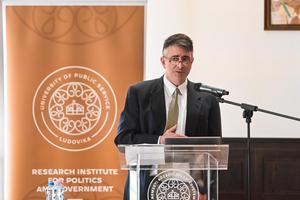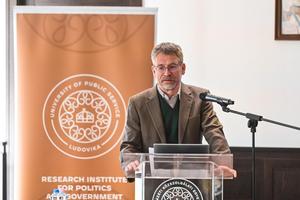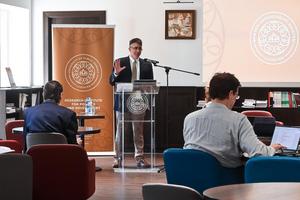On 20th March 2024, the Research Institute for Politics and Government (RIPG) at Eötvös József Research Centre, Ludovika University of Public Service hosted a lecture on the political application of the concepts of tradition and deliberation of pre-eminent 20th-century German philosopher Hans-Georg Gadamer (1900‒2002). The guest speaker was a distinguished American political theorist, Ryan R. Holston, Professor at Virginia Military Institute, Department of International Studies & Political Science.
Prof. Ferenc Hörcher, director of RIPG introduced Prof. Holston, especially highlighting the importance of his latest book Tradition and the Deliberative Turn: A Critique of Contemporary Democratic Theory (The State University of New York Press, Albany NY, 2023). This theme is directly relevant for RIPG’s ongoing research projects on British and American constitutionalism from a comparative European perspective, and on Post-WWII German conservatism, in which Gadamer takes a crucial place.
Prof. Holston started his lecture by criticizing the mainstream theory of “deliberative democracy” that has been in the focus of much scholarly attention over the past two decades. Based on the concept that deliberation is central to moral and political decision-making, it has ancient roots in the Aristotelian tradition, although “exponents of deliberative democracy approach the subject with a different set of concerns, focusing not on the ethical character of citizen and regime, but on the liberal values of freedom and equality.”
By applying the philosophical hermeneutics of Gadamer to political theory, Holston criticized this approach for “no longer appreciating or valuing the essential preconditions that made such dialogue possible.” Deliberative democrats “take for granted shared understandings of fundamental values, while positing or presupposing their existence for citizens who lack the sort of experiential background that would make sound deliberation possible.” Holston traced this philosophical tradition back to Enlightened thinkers like Rousseau and Kant, with John Rawls and Jürgen Habermas being its most prominent late 20th-century inheritors, who shared the rejection of metaphysics in the grounding of laws and policies, arguing for “a universal perspective acceptable to all citizens.”
Drawing on the philosophy of Gadamer, Holston convincingly showed, why “the claims of contemporary democratic theory regarding universal reason and deliberation [were] unrealistic to the point of being utopian.” Morality cannot be severed from “concrete historical contexts in which language develops through its repeated use”, that make shared understanding possible. True deliberation is therefore not possible on the largest of scales, only in historically developed organic communities.
Gadamer’s theory on the embeddedness of morality in tradition might raise suspicion of moral relativism, as criticisms by Habermas and Leo Strauss pointed out. Holston argued that the dichotomy between moral truth and relativity was a false one, since no exact scientific knowledge can ever be reached in the field of morality.
Holston demonstrated the key influence of Aristotle on Gadamer’s thought through the relations between the notions of phronesis, prohairesis, episteme, techne, ergon, ethos and logos. According to him, the concept of friendship (philia) is essential to deliberation (bouleuesthai) by the use of language in order to reason and seek agreement on the good, grounded in preconscious dispositions (hexis). It requires synesis, an “act of understanding towards others” only possible in relationships of philia. True and genuine deliberation is, therefore, only possible in a community characterized by philia, and ethics “requires attachment to particular people as a precondition of its occurrence.” Impartial ethical judgement, contrary to many contemporary analytic thinkers, is impossible, as what is right or wrong can only be decided in fully concrete situations regarding “the judgement by and for the philos (dear, beloved friend) ‒ that can be seen to facilitate genuine deliberation about a choice of action.”
Holston concluded his talk by referring to the significance of Gadamer’s rehabilitation of tradition, authority and prejudices, criticizing “prejudice-free understanding”, the “epistemological idol of modernity”, following the German philosopher’s convincing argumentation for tradition being “the essential precondition of all real understanding”. The crisis of contemporary Western liberal democracies can be traced back to the lack of shared concepts of truth and mutual understanding of reality, that can only be solved by “the forging of a sensus communis upon which we draw and through which we may achieve real understanding with regard to the good that is common between us.” Based on Gadamer’s thought, such knowledge is only “possible within the ethical life”, making the development of the ethical person “a normative priority”. Neglecting that importance of necessary preconditions contributing to true understanding, as contemporary democratic theory has done, has serious consequences, making authentic deliberation over the common good impossible, even if they “make sound political deliberation the very centerpiece of their political philosophy.”
Holston’s lecture was followed by a response from Ferenc Hörcher, who summed up possible criticisms of Gadamer’s position revolving around the issues of relativism, the size of the community, and multiculturalism. Prof. Hörcher’s questions were followed by a response from Prof. Holston, who emphasized the importance of an Aristotelian medium between extremes in Gadamer’s philosophy, and connected it to Edmund Burke’s conservative political thought. As he saw it, Gadamer would be critical with how democracy is conceived today. The event concluded with questions from the audience.
Text by: Kálmán Tóth, Research fellow, EJRC, Research Institute for Politics and Government




